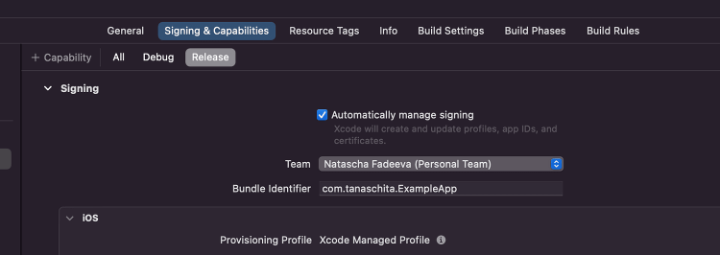iOS
This web page might be outdated, please refer to this site for an up-to-date guide on native app passkeys.
The implementation for Flutter iOS is still very similar to native iOS with Swift, as there is no good Flutter SDK for Passkeys / WebAuthn yet.
Origin
Contrary to Android, the origin for WebAuthn doesn't require a specific format and is a regular URL,
e.g. pro-xxx.auth.corbado.com.
Apple App Site Association (AASA)
To associate a native app with a web app, iOS requires an Apple App Site Association (AASA)
file apple-app-site-association.json. Use the following JSON
template and store it under acme.com/.well-known/apple-app-site-association.json:
{
"appclips": {
"apps": []
},
"applinks": {
"apps": []
},
"webcredentials": {
"apps": [
"{ APP_IDENTIFIER_PREFIX }.{ BUNDLE_IDENTIFIER }"
]
}
}
Variables:
APP_IDENTIFIER_PREFIX: The iOS app identifier prefix associated with your development team in your Apple Developer account (sometimes also referred to as TeamID).BUNDLE_IDENTIFIER: The bundle identifier associated with your iOS application. Can be found in Xcode development environment (sometimes also referred to as BundleID).
The following constraints must hold for the file:
- It must be publicly available, and not behind a VPN.
- It must be served with Content-type: application/json.
- It must be accessible over HTTPS.
- It must be served directly with an HTTP 200 response (no HTTP 300’s redirect).
- Ensure no robots TXT prevents it:
- User-agent: *
- Allow: /.well-known/
Binding passkeys to your own domain
If you want to bind the passkeys to your own domain (e.g. acme.com), you need to manually change
the WebAuthn relying party and host
the AASA file on this domain (so
on acme.com/.well-known/apple-app-site-association).
iOS native implementation
Apple offers straight-forward documentation for integrating passkeys in a native iOS app. Contrary to Android / Kotlin, there is no third party library necessary for executing the WebAuthn / passkey requests to the WebAuthn server.
iOS WKWebView implementation
Passkeys / WebAuthn in WKWebView only seem to work with native apps that have the web browser entitlement (source).
Workaround: SFSafariViewController
You can redirect the browser to a prepared website or via SFSafariViewController (see Android Custom Tabs for Android).
Native app linking
To link native iOS apps to web apps and allow intercepting links or accessing passwords stored in WebView Android uses AASA. To inform the iOS operating system and the native app on which domains to look for AASA files you need to:
- Enable
Associated Domainson your app identifier - Enable
Associated Domainsunder Signing and Capabilities (Xcode) and add your domain there (without https prefix, just the hostname)


- Beware: Starting with iOS 14 AASA files are served from Apple CDN, cached and irregularly refreshed. This can be bypassed in developer mode (see here)
- In our case we need
applinks: allow native apps to open linkswebcredentials: share credentials between web apps and native apps
The AASA file itself has multiple sections. For us, only the webcredentials (
formerly access to keychain for user/password stored in browser, now also expanded to passkeys) and
the applinks (= Universal Links) section is
important (see docs).
Technically, only the webcredentials are needed to be able to exchange password and/or passkeys, but applinks need
to
be specified to intercept email magic links. The apps that are allowed to open them are
identified with a string like: Y7L2DPA5Y5.com.corbado.passkeys (TeamID.BundleID)
The string starts with the TeamID Y7L2DPA5Y5. It can be found in Apple's developer portal within the URL in the
browser or under Membership area in the App Developer Section on https://developer.apple.com (=TeamID)
and is then followed by
the bundle identifier (=bundleID) of the app as specified in
Xcode (help for the SDK).
Custom URL schemes
They allow to work with any scheme without host specification. The only thing is that the scheme must be
unique: your_scheme://any_host or corbado://any_host (comparable
to Deep Links in Android).
Universal Links
They only work with an https scheme and specified host, entitlements and
hosted AASA: https://your_host (comparable
to Android App Links in Android).